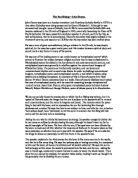Lover’s Infiniteness
Q. How has John Donne treated the theme of love in his poem ‘Lover’s Infiniteness’?
Through his poem, John Donne, expresses his yearning to possess ‘all’ of his lady-love’s affection. He narrates about the pain and feelings he faces whilst trying to woo her. ‘Lover’s Infiniteness’ is part of Donne’s complex collection of literary work known as ‘Songs and Sonnets’; this particular piece was published in 1601. The poem deals with a question of how ‘vast’ or unconditional someone’s love can be, thus the word ‘Infiniteness’ in the title which expresses the enormity of Donne’s love for her.
Being a metaphysical poet, Donne induces the elements of religion, identity, passion and reasoning into his poetry- for instance, in this specific poem, he emphasizes his ‘desire’ for the ownership of his lover’s heart yet, continues to think deeply and question her faithfulness to him. This further leads him into overthinking about the unquestioning love he has for her and how she might never reciprocate that amount of love to him.
The tone of the poem suggests insecurity and- subtly- jealousy and possessiveness: this can be evident through lines such as ‘This new love may beget new fears’, ‘New love created be, by other men’, ‘The ground, thy heart is mine…have it all’. Using a variety of literary devices, Donne puts across the main idea of the poem vividly. Donne compares love to a ‘transaction’ wherein he expects his lady-love to ‘gift’ her love to him after he has ‘spent’ a lot of his ‘sighs, tears, and oaths, and letters’ to ‘purchase’ her heart- this is one of the many examples of both metaphor and visual imagery he uses(a clear picture of his efforts is being made). Some instances of the usage of paradox can also be seen: ‘If thou canst not give it, then thou never gav’st it’ expresses that if she doesn’t care for him every single day, then it would mean that never ever cared for him.








